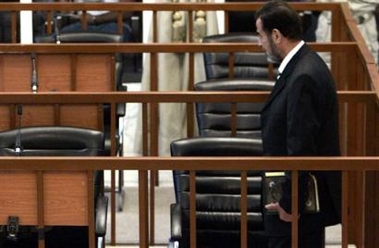Saddam Hussein's trial entered a new phase Monday, when the chief judge
formally charged the ousted Iraqi leader with murder, torture of women and
children and the illegal arrest of 399 people in a crackdown against Shiites in
the 1980s.

Former Iraqi President Saddam Hussein arrives
at his trial in Baghdad's heavily fortified Green Zone, Monday, May 15,
2006 in Baghdad, Iraq. [AP] |
Saddam, who sat
alone in the defendants' pen as the charges were read, refused to
enter a plea when chief judge Raouf Abdel-Rahman asked him if he were guilty
or not.
"I can't just say yes or no to this. You read all this for the sake of public
consumption, and I can't answer it in brief," Saddam replied. "This will never
shake one hair of my head."
"You are before Saddam Hussein, president of Iraq. I am the president of Iraq
according to the will of the Iraqis and I am still the president up to this
moment," he said. Abdel-Rahman entered a "not guilty" plea on Saddam's behalf.
Saddam and seven former members of his regime have been on trial for nearly
seven months over the crackdown against residents of the town of Dujail.
Under the Iraqi system, the court first hears plaintiffs outline their
complaint against the defendants and the prosecutions' evidence against them.
Then the judges decide on specific charges, and the defense begins making its
case.
Security forces arrested hundreds of Dujail residents, including entire
families, after a 1982 attempt on Saddam's life in the town. Witnesses,
including women, have recounted being tortured while in prison, farmlands were
razed in retaliation and 148 Shiites were sentenced to death in connection to
the shooting attack on Saddam. All 148 were killed, either dying under
interrogation or executed.
The charges against Saddam read by Abdel-Rahman included the arrest of 399
people, the torture of women and children, and ordering the razing of farmlands.
He was also charged in the deaths of nine people who Abdel-Rahman said were
killed in the first days of the crackdown. Saddam was not charged in the deaths
of the 148 who were sentenced to death by his Revolutionary Court.
"After allegations of coming under an assassination attempt, you issued
orders to security forces and the army to arrest residents and use all weapons
against them," Abdel-Rahman told Saddam.
"As a result for your orders to use force against Dujail residents, nine
people were killed in the first two days ... and 399 others were arrested," he
said.
After Saddam refused to enter a plea, Abdel-Rahman called in the next
defendant, Saddam's half-brother Barzan Ibrahim, former head of the Mukhabarat
intelligence agency. He read the same charges against Ibrahim, adding a charge
of murder for the killing of the 148 Shiites sentenced to death.
"All you said are lies, everything you mentioned is a lie," Ibrahim replied
when Abdel-Rahman asked him for his plea.
Abdel-Rahman then proceded to call in each of the remaining defendants one by
one to read the charges against them.